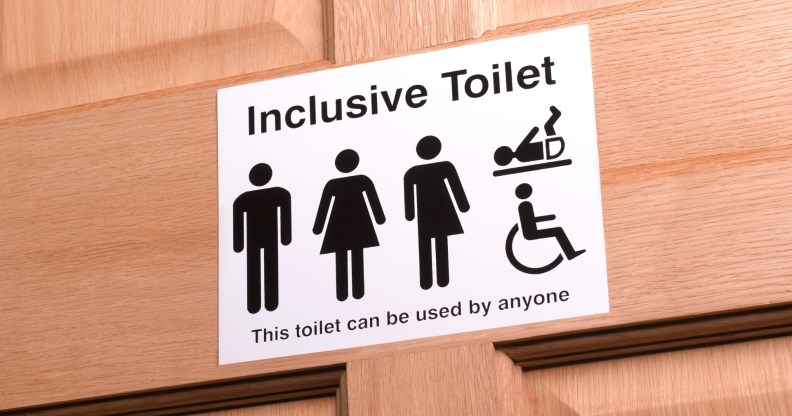Kansas to force trans people to reverse gender markers on birth certificates and driving licences

Kansas lawmakers passed a “discriminatory” bill to ban trans people from bathrooms in April. (Peter Dazeley/Getty Images)
A Kansas law will reverse gender markers on trans people’s birth certificates and driving licences, in a move deemed “disastrous” for those affected.
On Monday (26 June), state attorney general Kris Kobach confirmed to reporters that the new law – Senate Bill 180 – which takes effect from 1 July, will legally erase trans people’s gender identities.
The Republican-controlled legislature enacted the law despite Democratic governor Laura Kelly vetoing it in April.
Kobach said the law will also force public schools to record students as the gender assigned at birth, regardless of whether teachers and staff recognise gender identities of trans and non-binary students.
The legislation, described by the Kansas Senate as a “women’s bill of rights,” defines “sex” as “either male or female at birth” in state law, with no alternative definition for individuals who identify as trans, non-binary, gender fluid, or gender-non-conforming.
In addition, trans people will be forced to use toilets and other single-sex spaces corresponding to the gender they were assigned at birth.
Republican representative Brenda Landwehr, who voted for the bill, said it would “protect women’s spaces currently reserved for women and men’s spaces currently reserved for men”.
‘That does not make you a woman’
Senator Renee Erickson, one of three Republican lawmakers who joined Kobach during his news conference, said: “You can choose whatever name you want. You can choose to live however you want. That does not make you a woman.”
The law follows a 2019 ruling which saw a federal judge order Kansas to allow trans people to change their birth certificates to settle a lawsuit over a no-change policy. SB 180 would see the 2019 order cancelled.
Micah Kubic, the executive director of the American Civil Liberties Union of Kansas, accused Kobach of rushing to “impose his own stamp of extremism”. He added that state agencies are not required to adopt the attorney general’s views.
‘Disastrous and fraught with difficulty’
Trans activist and journalist Erin Reed, whose partner is trans Montana lawmaker Zooey Zephyr, said of the new law: “Rolling back transgender people’s legal markers would be disastrous and fraught with difficulty.”
Reed said enforcing incorrect gender markers could lead trans people to experience heightened “harassment and abuse”.
In May, Montana’s Senate Bill 458 was signed into law. The Republican-backed legislation defines “sex” as binary – excluding intersex, non-binary and trans people.
Zephyr has been vocal in opposing Republican’s anti-LGBTQ+ bills, which saw her banned from the floor of the state’s House of Representatives.
‘Calculated manoeuvre’
Reed added: “The calculated manoeuvre of redefining sex to systematically exclude transgender individuals is an attempt to sidestep legal challenges. These laws represent a clear attempt to move beyond targeting transgender youth and the beginning of the campaign to eradicate transgender adults from all legal protections.”
According to AP News, Omar Gonzalez-Pagan, a lawyer for Lambda Legal, said: “The attorney general must be off his rocker. This was a bunch of bombast by an attorney general engaging in politics.”
Kansas’ bill comes after Idaho’s governor, Brad Little, signed a law that restricts trans students from using the correct toilets and changing rooms, with a fine of up to $5,000 (approximately £4,000) for each person of the “opposite sex” found in single-sex facilities.
The bill is just one of hundreds of anti-LGBTQ+ laws currently making their way through statehouses across America, with the Human Right Campaign having tracked more than 460 pieces of anti-LGBTQ+ legislation in 2023, including at least “25 bathroom bills filed”, and numerous proposals to ban or limit gender-affirming care for young people.
How did this story make you feel?

